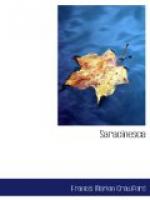“That is a very pretty speech,” she said.
“Which you would have lost if you had not received me,” he answered, gaily. “I have not done yet. I have many pretty speeches for you. The sight of you induces beauty in language as the sun in May makes the flowers open.”
“That is another,” laughed Corona. “Do you spend your days in studying the poets at Saracinesca? Does Don Giovanni study with you?”
“Giovanni is a fact,” returned the Prince; “I am a fable. Old men are always fables, for they represent, in a harmless form, the follies of all mankind; their end is always in itself a moral, and young people can learn much by studying them.”
“Your comparison is witty,” said Corona, who was much amused at old Saracinesca’s conversation; “but I doubt whether you are so harmless as you represent. You are certainly not foolish, and I am not sure whether, as a study for the young—” she hesitated, and laughed.
“Whether extremely young persons would have the wit to comprehend virtue by the concealment of it—to say, as that witty old Roman said, that the images of Cassius and Brutus were more remarkable than those of any one else, for the very reason that they were nowhere to be seen—like my virtues? Giovanni, for instance, is the very reverse of me in that, though he has shown such singularly bad taste in resembling my outward man.”
“One should never conceal virtues,” said Sister Gabrielle, gently. “One should not hide one’s light under a basket, you know.”
“My Sister,” replied the old Prince, his black eyes twinkling merrily, “if I had in my whole composition as much light as would enable you to read half-a-dozen words in your breviary, it should be at your disposal. I would set it in the midst of Piazza Colonna, and call it the most wonderful illumination on record. Unfortunately my light, like the lantern of a solitary miner, is only perceptible to myself, and dimly at that.”
“You must not depreciate yourself so very much,” said Corona.
“No; that is true. You will either believe I am speaking the truth, or you will not. I do not know which would be the worse fate. I will change the subject. My son Giovanni, Duchessa, desires to be remembered in your good graces.”
“Thanks. How is he?”
“He is well, but the temper of him is marvellously melancholy. He is building an aqueduct, and so am I. The thing is accomplished by his working perpetually while I smoke cigarettes and read novels.”
“The division of labour is to your advantage, I should say,” remarked Corona.
“Immensely, I assure you. He promotes the natural advantages of my lands, and I encourage the traffic in tobacco and literature. He works from morning till night, is his own engineer, contractor, overseer, and master-mason. He does everything, and does it well. If we were less barbarous in our bachelor establishment I would ask you to come and see us—in earnest this time—and visit the work we are doing. It is well worth while. Perhaps you would consent as it is. We will vacate the castle for your benefit, and mount guard outside the gates all night.”




